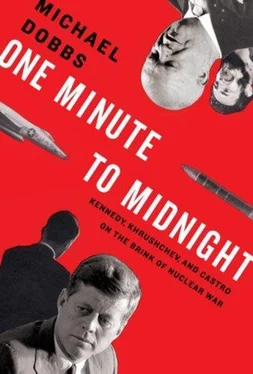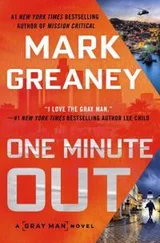Human psychology and stamina being what they are, this high peak of proficiency cannot be maintained indefinitely because fighters of all types go stale as is so well documented in pugilistic annals and all other competitive fields where combat readiness is required….
While this [is] well known Headquarters believe fluctuations in go and stop orders over past seven days have been such that prudent judgment dictates that you be personally appraised that we are sitting on explosive human situation which could blow at any time within next forty-eight hours. Wish assure you that while full gamut of leadership tradecraft psychology and discipline will be harnessed to prevent any human explosion we cannot guarantee that it will not happen.
• • •
On the other side of the Florida Straits, in Havana, the Soviet ambassador was doing his best to calm down an indignant Fidel Castro. The Cuban leader had been outraged to learn from the radio that morning of Nikita Khrushchev’s proposal for a Cuba-Turkey missile swap. His naturally suspicious mind interpreted this as a signal that his country could become a pawn in some kind of grand bargain between the superpowers.
“Friends simply don’t behave in this way,” he raged to Aleksandr Alekseev, when the ambassador called on him on Saturday evening with an official explanation of the latest Soviet position. “It’s immoral.”
After three years of dealing with Castro, Alekseev was accustomed to defusing his anger. He was constantly looking for ways to avoid offending his host while carrying out the instructions of his own government. It was a tricky balancing act. He sometimes reworded messages from Moscow to make them more acceptable to the explosive Cuban. His approach this time was to put his own reassuring spin on a message that had managed to set alarm bells ringing in Washington, Havana, and Ankara.
“As I see it, Nikita Sergeyevich is not posing the question of a trade,” the ambassador said soothingly.
Alekseev depicted Khrushchev’s letter as a negotiating ploy, designed to expose the hypocrisy of the American position. The United States claimed it had the right to deploy missiles around the borders of the Soviet Union, but denied a similar right to Moscow. It was most unlikely that Kennedy would accept Khrushchev’s offer. Nikita’s maneuver would make it easier to justify the presence of Soviet missiles in Cuba to international public opinion.
Though still not satisfied, Castro began to soften. He told Alekseev that the first news reports on the letter had “confused” certain sections of Cuban public opinion, including the military. Some officers had asked him whether Moscow was reneging on its commitments to Cuba. He would do his best to explain the logic behind the proposal to the Cuban people.
Castro was not as nervous as he had been the previous night, when he appeared at the Soviet Embassy in Vedado and announced that a U.S. attack was imminent. As Alekseev later reported to Moscow, “He began to assess the situation more calmly and realistically…. He nevertheless continues to believe that the danger of a sudden attack still exists as before.”
Despite his frustration with Khrushchev, Castro was delighted that his Soviet comrades had shot down an American spy plane. He told the ambassador that the Cuban authorities had collected the wreckage of the plane, along with “the corpse of the pilot.” Without knowing the military details, Alekseev assumed that the U-2 had been downed by the Cubans, not the Soviets. His subsequent report to Moscow sidestepped the question of responsibility, but emphasized that Fidel felt fully justified in ordering his forces to respond to any American overflights.
“Castro said that in the event of an [American] attack, full fire would be turned against the aggressor, and that he was sure of success,” Alekseev cabled.
9:52 P.M. SATURDAY, OCTOBER 27
Valentin Savitsky had finally concluded that the only reasonable choice left open to him was to come to the surface. The commander of submarine B-59 had been tempted to use his nuclear torpedo to blast his tormentors out of the water, but his fellow officers had persuaded him to calm down. He made the decision to surface jointly with the chief of staff of the flotilla, Vasily Arkhipov. As soon as they were able to raise the radio antenna, they sent a message to naval headquarters, giving their location and recounting what had happened.
As B-59 rose to the surface with a giant gurgling sound, the Soviet sailors were startled to find the whole area floodlit. They had surfaced in the midst of four American destroyers. Helicopters hovered overhead, illuminating the sea with powerful searchlights. Bobbing up and down on the waves were dozens of sonobuoys used by the Americans to pinpoint the location of the submarine, easily identifiable by their flickering navigation lights. It seemed as if the dark sea was ablaze with fire. U.S. Navy logs recorded the time as 9:52 p.m.
Savitsky went up to the bridge, accompanied by Arkhipov and several other officers. It was 30 degrees cooler up here than down below. They drank in the night air like drowning men gasping for breath. One officer “almost fell into the water from the sensation of gulping down so much fresh sea air.” As they caught their first glimpse of the sailors on the decks of the American warships in their neatly pressed uniforms, the Soviet officers felt even more uncomfortable and humiliated. They were dirty, dispirited, and exhausted. Their submarine was in terrible shape. But they also felt a defiant pride. They had undertaken a 5,000-mile odyssey, to seas that no Soviet submariner had sailed before. They had endured physical hardships that their smartly dressed enemies could barely imagine. It was the machines that had failed, not the men of B-59.
Savitsky ordered his men to run up the Soviet flag. Not the blue-and-white pennant of the Soviet navy, but the crimson red flag of the Soviet state, with the hammer and sickle emblazoned in the corner. It was his way of signaling that his battered vessel was under the protection of a mighty superpower. One of the American destroyers sent a message by flashing light asking if he needed assistance. “This ship belongs to the Union of Soviet Socialist Republics,” Savitsky replied. “Halt your provocative actions.”
American S2F tracker planes made repeated low-level runs at B-59, taking photographs and dropping more sonobuoys, recording devices, and flares. The flares dropped several hundred feet before igniting in a brilliant incendiary display. Each flare had the power of 50 million candles. From the bridge of B-59, it seemed as if the planes were making practice bombing runs. Lookouts reported that the Americans were spraying the sea with machine-gun tracer fire.
After an hour or so, a radio message arrived from Moscow instructing B-59 “to throw off your pursuers” and move to a reserve position closer to Bermuda. But that was easier said than done. Everywhere he looked, Savitsky could see American warships and planes. The sea was a cauldron of blazing light.
11:00 P.M. SATURDAY, OCTOBER 27 (10:00 P.M. HAVANA)
Americans went to bed on Saturday night in a state of high uncertainty, not knowing what the next day would bring. The White House was almost deserted. Kennedy dismissed most of his aides, telling them to go home to their wives and families and get some rest. The one person he kept by his side was Dave Powers, Camelot’s court jester. The wry little Irishman had the job of boosting JFK’s spirits when they were low. On any given day, Powers was usually the first staffer to say good morning to the president and the last to wish him goodnight. His duties included ensuring a plentiful supply of clean shirts and cool drinks. He often arranged for women to visit his boss when he was traveling or Jackie was away.
Читать дальше












